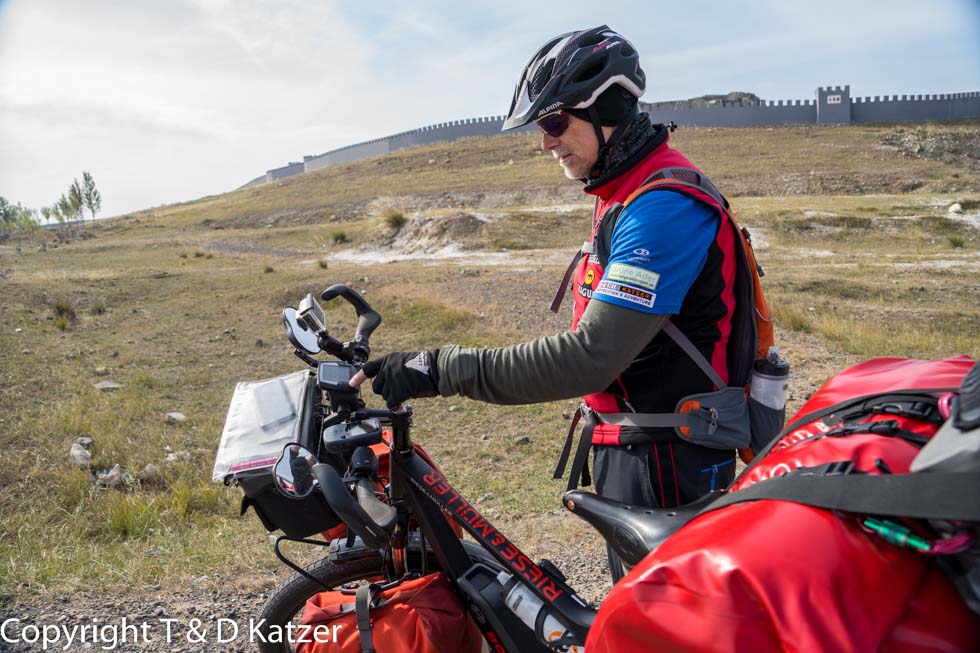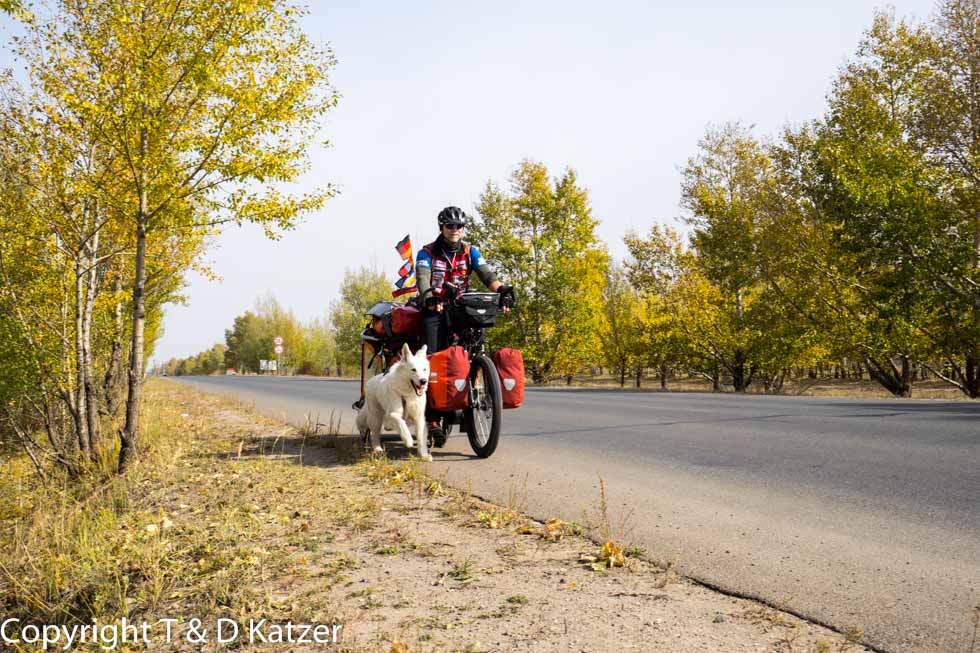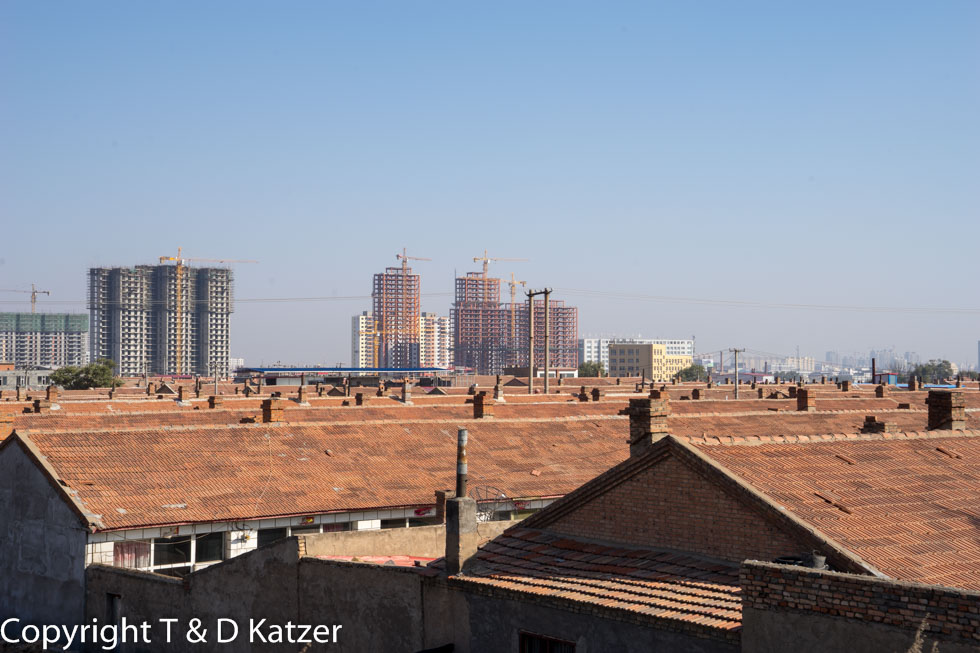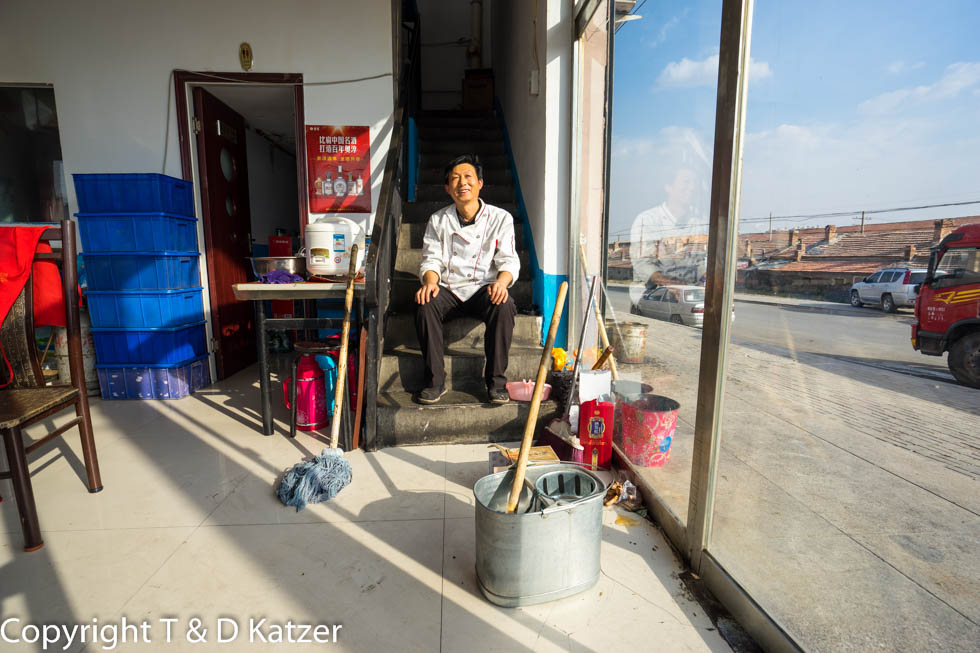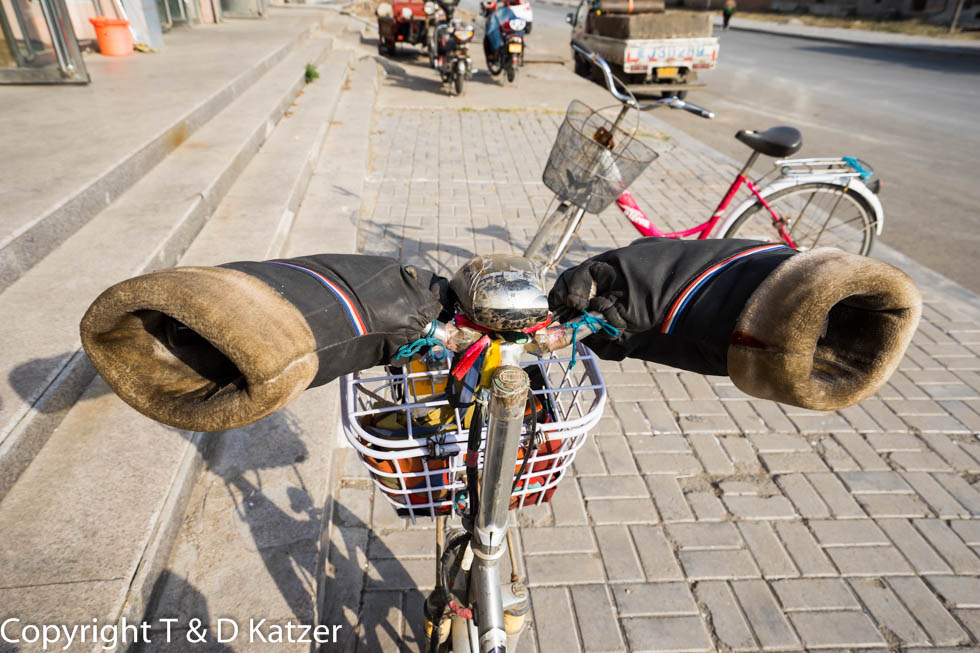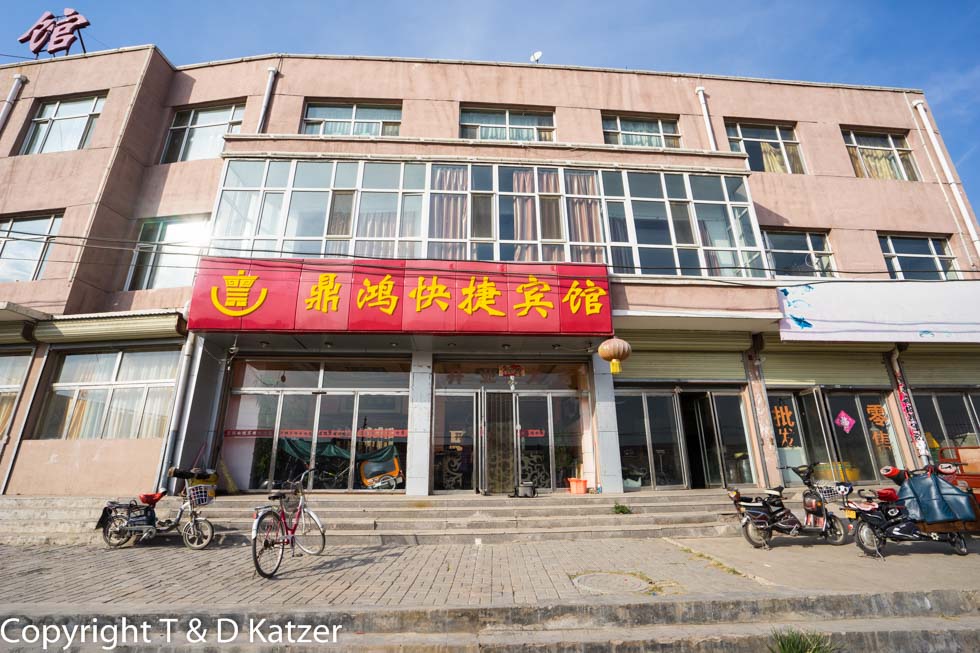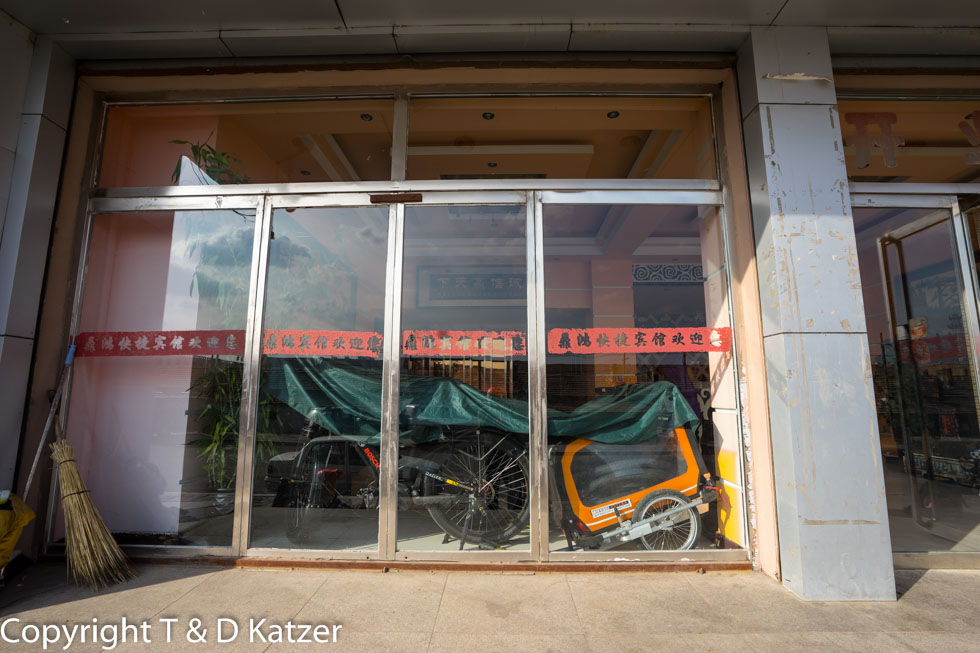
Nerves of steel
N 41°02'51.6'' E 113°05'40.3''
Date:
14.10.2015
Day: 108
Country:
China
Location:
Ulanqab
Latitude N:
41°02’51.6”
Longitude E:
113°05’40.3”
Daily kilometers:
54.45 km
Total kilometers:
9,717 km
As the crow flies:
44.09 km
Average speed:
23.0
Maximum speed:
51.3 km/h
Travel time:
2:27 hrs.
Soil condition:
Asphalt
Maximum height:
1.485 m
Total altitude meters:
5.025 m
Altitude meters for the day:
85 m
Tailwind Wind force: 4
25 km/h
Sunrise:
06:36 am
Sunset:
17:51
Temperature day max:
16 °C
Night temperature:
2 °C
Departure:
09:15 a.m.
Arrival time:
1:30 pm
Total plate tires:
8
Plate front tire:
2
Flat rear tire:
5
Plate trailer tire:
1
(Photos of the diary entry can be found at the end of the text).
The hotel manager says goodbye with a handshake and strokes Ajaci’s head. “You can come back at any time,” he says kindly. “You obviously did everything right Ajaci,” I whisper in our dog’s ear.
We set off in glorious weather and over 20 °C in the sun and even work up a bit of a sweat. The long johns we’ve needed since Erenhot are a thing of the past. Our destination today is the city of Ulanqab. It is only a small spot on my map and yet, with 2 million inhabitants, it is larger than the capital of Mongolia. The small Chinese town will mark our southernmost border for the time being, as we cycle west from there for about 560 km to the town of Bayannur. At least that is the current plan. The autumnal green remains with us today. Construction activity in all villages also remains high. People are digging and concreting as if there were no tomorrow, as if there would be no more concrete tomorrow. It seems to me that the government in Beijing is mobilizing against poverty in the countryside. I read that China consumed 1.8 billion tons of cement in 2010. With an annual global cement production of 3.3 billion tons, this represents 55 percent of global demand. Even though we have only seen a little of this large country so far, I have noticed that construction is going on in every corner of every settlement or small town. Of course, the growing population of almost 1.4 billion people needs living space. Concrete seems to be more important than gold in this country. The farmers’ last mud and straw houses are increasingly giving way to ugly concrete blocks housing hundreds, and in the country’s big cities even tens of thousands of people. One example of this is the new CCTV building in Beijing, which is 230 meters high. It has a floor area of no less than 400,000 square meters. This corresponds to a space that can accommodate 2,500 single-family homes and 10,000 people coming and going every day. In Shanghai, a metropolitan region with a population of 24 million, China’s tallest building to date, the 632-meter Shanghai Tower, now stretches its spire into the exhaust-dimmed sky. These are just two examples of China’s growing and booming mega-metropolises, which were formed from the material concrete and explain to me why a country can consume the unimaginable amount of 1.8 billion tons of concrete within a single year.
When I think about it, I’m really happy to be traveling away from the hustle and bustle of the big cities. Here in the countryside, no skyscrapers are being built yet, just lots of small houses that hardly differ from one another. They are all painted in yellow, the color that has characterized China as a cultural nation for ages. The roofs, on the other hand, are covered with red tiles. In this color combination, the Chinese farmhouses radiate something cheerful and positive.
The closer we get to the city, the hazier the air becomes. Is this due to the air pollution? Or are we just imagining it? After all, we are on the edge of the vast Gobi Desert, which is relatively sparsely populated compared to other provinces in China. Maybe it’s just high fog or the weather. What can we say when we’ve only just arrived.
When we cycle into Ulanqab, the university is having its lunch break. Hundreds of students crowd the sidewalks of the wide street. A large number of bicycles and electric bikes whizz back and forth in two directions on the hard shoulder of the main road. Some of the electric bike riders ride side by side and chat animatedly, others simply stand still while an old man rides so slowly that he almost stumbles. Pedestrians walk between them, not looking left or right. It requires a great deal of concentration to steer our heavy e-bikes through the crowds and at the same time to recognize unpredictable actions and reactions of the Chinese traffic in good time.
Again, we let our instincts guide us and turn left into a busy street. I stop in front of a building that looks like a hotel. “It’s actually a hotel,” I say happily. As in the last city, I let my charm play out and ask if we can stay. Although I’ve already written enough about accommodation and the challenges associated with it, and am of the opinion that it’s finally over, there are always new variations. This one could really drive you to despair and demands a great deal of composure, acceptance and tolerance from us.
The Chinese woman is startled when she sees me coming towards her through the revolving door. Then she smiles when I politely ask her for a room for the night. She immediately picks up the phone and talks for a while to someone on the other end of the line. Well, I know that by now. Then she asks if I have a passport. “Of course,” I reply in Franconian, because she doesn’t understand my Chinese anyway. I hand her our passports. Again, something incomprehensible to me is spoken into the telephone receiver. As far as I understand now, we are allowed to stay. Relieved, I point to the bikes. “They have to go in.” The woman thinks about it and nods. That’s cleared up too. “Puhhh.” Now comes the hardest part. I put a piece of paper with Ajaci’s words of praise on the table. In Chinese script, of course. My counterpart’s eyes widen. I calm them down and place a business card from the hotel manager of the last accommodation on the table. He has written on it what a well-behaved creature our dog is, to defuse such situations from the outset. The receptionist smiles with relief. She reaches for the phone again. As she hangs up, she starts to eat something. I stand there grinning stupidly and wait. Five minutes later, I’m still standing there and my grin slowly freezes. She looks up shyly and shoves something into her mouth with the chopsticks. Hang in there Denis. If we weren’t allowed in, she would probably have said bu or meiyou (no or not) by now. I already understand that very well. The bowl is now empty. My grin has fallen off my face. Using sign language, she now offers me a seat in the soft armchairs in the lobby. “Xie xie”, (thank you) I say and go outside to report to Tanja. As we can watch our bikes through the large window, Tanja sinks into the large sofa next to me. “And what are we going to do now?” she asks, “Wait.” “For what?” “Well, I wish I knew. Maybe for a call back from your boss?” After another ten minutes, Tanja stands up and takes the reins. In the meantime, the receptionist has reinforcements. Tanja speaks to the two women in a language that could be called Deuengchininzei. So translated: German, English, Chinese international sign language with terrible pronunciation. I watch her with amusement and am amazed at how she progresses bit by bit. But suddenly the word sounds: “Meiyou!”, (Not) “How Meiyou?”, asks Tanja, startled after all her efforts. There must be something wrong with our passports, we understand. “Yes, but they’re correct. They’re great passports with a super visa. Look,” Tanja explains, pointing to the visa. “And look, we’ve already stayed in lots of hotels,” she says and shows the friendly ladies a mountain full of receipts from our last accommodation. The two of them don’t know what to do except repeat a shy “Meiyou”. “Does that mean we won’t get a room?” Tanja rears up one last time. “Bu.” (no) “I bring you to another hotel,” the younger of the two suddenly says in English. I don’t believe that now. We struggle for 45 minutes, sweating, making wild signs, pulling out all the stops of international sign language and then the girl speaks English. Not well, but at least. She shyly follows us outside and half-heartedly waves for a cab. “Shall we follow them with the bikes?” I ask. “Yes,” she replies. When the first cab has passed by, she grabs her cell phone and makes calls and calls and calls. In the meantime, a large group of people has formed around us. Many of the onlookers speak to us in Chinese. Meanwhile, an hour has passed. Because the sun is shining from the sky today, we are steaming along easily. “What are you doing now?” wonders Tanja. “Well, I wish I knew,” I reply again, trying not to lose my initially perfect mood completely. “Now we’ve arrived so early and are waiting for our afternoon here,” says Tanja, annoyed. The girl with the phone is lost in the crowd. “Where is she?” asks Tanja. “Well, I wish I knew,” I repeat, looking for her in the ever-growing crowd. Meanwhile, the crowd has also spread out onto the street. “I don’t think that makes any more sense,” I say as more and more hands fumble around on my bike and the discussion about us breaks out. “I’ve heard they’re from Germany.” “Nonsense, they’re Russians.” “No, no, they’re Indians.” “You’re crazy. No way.” “Look at the tires.” “Yes, yes, they’re really hard.” “And what do they have on the handlebars?” “And in all those bags?” I think I understand, but as my Chinese is so bad, it could mean something completely different. “No hotel,” says the girl after making her way through the crowd. We are speechless. Is that a hotel over there?” I ask one of the passers-by. “Shide”, (yes) I hear, whereupon we push our bikes to the other side of the street and park them in front of the run-down building. Once again we ask for a place to stay for the night. They don’t want to see passports here, there are no phone calls and I don’t have to sit on the sofa for 45 minutes. “Simply unbelievable,” I say. “Even the dog isn’t an issue,” Tanja replies, also taken aback. But then things turn out differently than expected because the bikes are supposed to be in a dirty backyard that is open to the street. We invest another ten minutes of stubborn negotiation until the bikes are allowed to spend the night in the lobby by the window. “Puhhh”, we’ve finally made it. While I pack everything up, Tanja carries the equipment up to the third floor. The room is a disaster, very dirty but cheap at 118 yuan (€16.37). But we don’t care, the main thing is that we’ve made it. As soon as the saddlebags are sorted next to the beds, I call Spring to ask her what makes checking into hotels so problematic. “Yes Denis, that happens a lot. There are a lot of hotels in China that don’t have a license for foreigners. They are not allowed to take you in. If they do anyway, they get a heavy fine.” “Wow, so that’s why they made such a fuss today. And how can we tell which hotel has a license and which doesn’t?” “That’s impossible for you to tell. It’s best to ask from the start whether the hotel is licensed.” “Okay, then we’ll have another challenge finding accommodation with our bikes and the dog?” “I’m sorry, but that’s the way it is,” she replies.
In the evening, we are once again the superstars in the restaurant next door. As soon as we enter the room, we are greeted with a friendly “Hello!” and our cell phones are pulled out. The waitress and the chef have their photo taken with us. The pictures are immediately sent to friends and relatives. Who would have thought that something like this would still exist, but I’ve already said that. So if you want to experience the advantages and disadvantages of a real star, all you have to do is travel to China. This is certainly not the case everywhere. In Shanghai you won’t notice a foreigner very much, but here it’s indescribable…
The live coverage is supported by the companies Gesat GmbH: www.gesat.com and roda computer GmbH www.roda-computer.com The satellite telephone Explorer 300 from Gesat and the rugged notebook Pegasus RP9 from Roda are the pillars of the transmission.
